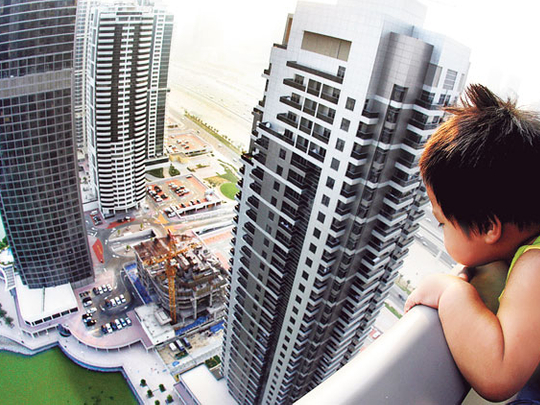
Everyday, thousands of tourists line up to visit the observation deck of the Burj Khalifa, the world’s tallest skyscraper. Visiting the deck located on the 124th floor of the iconic tower for breathtaking views of Dubai is probably on everyone’s to do list. Everyone, that is, except Jessica*.
When I first met the teen for a consultation at my Dubai office, she told me she had a problem - she feared heights. The thought of being high up anywhere, let alone up the Burj Khalifa, simply terrified her. She would actually feel sick and start to hyperventilate, she told me. She was even petrified of climbing a small ladder!
The kind of phobia that had gripped Jessica for years is called acrophobia, or the fear of heights. People who suffer from this phobia can fear several things related to being far from the ground, whether being high up a building or even climbing a set of stairs. What causes this kind of phobia? Some research claims it may be linked to a previous experience of falling, or an inner ear or balance issue.
The fact is millions of people are afraid of heights - whether it is the small ladder, a balcony or a tall building. Most people either avoid heights or manage their fears. However, if your phobia of heights becomes so extreme that it affects your everyday activities, then it is likely you are suffering from acrophobia.
Effects
Acrophobia can actually stir up all kinds of related conditions, such as inducing a vertigo-like condition which causes a sensation of spinning and dizziness. It is also closely related to bathmophobia, or when people develop a fear of slopes and stairs. Aerophobia or the fear of flying may occasionally occur alongside acrophobia.
People who experience acrophobia feel a rush of panic when they contemplating a high place or are actually at height. For example, while some people may feel butterflies in their stomach while peering over the edge of a tall building, acrophobes, on the other hand, feel queasy, dizzy, nauseous or faint. Some even become paralyzed, rooted to where they are standing. Often, they become unable to trust their sense of balance, which is why their common reaction is to get down immediately, kneel or crawl on all fours.
Like any other phobia, acrophobia can be emotionally taxing. Sufferers may panic, shake, sweat and even become upset. They can become terrified they are no longer thinking rationally. Socially, it becomes an impediment because the sufferer is likely to avoid situations and activities because of an imagined danger. Acrophobes often do everything they can to avoid heights in their daily life, to the point that it becomes disruptive to their overall well being.
A fear of heights may cause a person to pass on a great job at an office on a high building. Things like repairing lights at home may never get done. Even driving across a bridge would be terrifying. But the biggest danger is when sufferers have a panic attack while high off the ground, which could lead to serious accidents. This is why it is important to have acrophobia professional treated as quickly as possible.
Overcoming Acrophobia
People who suffer from acute acrophobia should seek professional help; you will learn valuable techniques to help train your mind on how to overcome irrational fear. A good professional practitioner will also help the person learn how to manage panic reactions and regain control.
If your phobia is mild, you can try mastering your fear by understanding what is triggering it. This will help you approach the situation differently. Try to relax, be objective and take small steps.
It also helps if you can learn how to control some of the physical symptoms. If you start to feel panic rising, take very deep breaths – concentrate on your breathing, you will need to relax fully to tackle the fear. Meditation can also be helpful. The key is to relax. Maybe try listening to soothing music. Even a light massage could also help relieve the physical symptoms of the phobia! With patience, you can beat the fear and take yourself and your self-confidence to the greatest of heights.
*Name changed to protect identity













